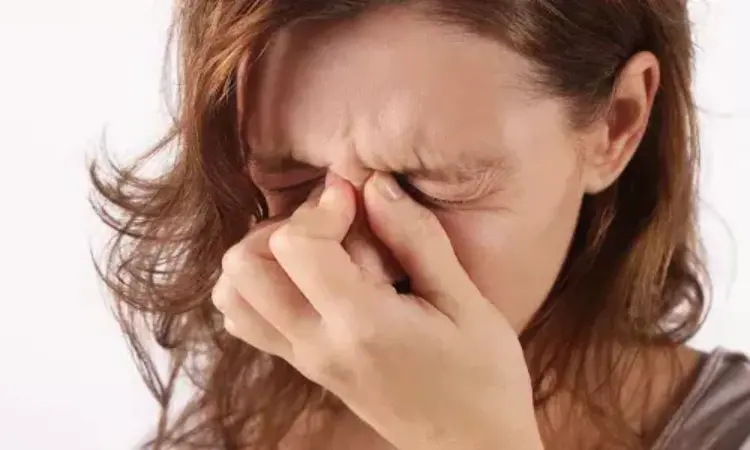- Home
- Medical news & Guidelines
- Anesthesiology
- Cardiology and CTVS
- Critical Care
- Dentistry
- Dermatology
- Diabetes and Endocrinology
- ENT
- Gastroenterology
- Medicine
- Nephrology
- Neurology
- Obstretics-Gynaecology
- Oncology
- Ophthalmology
- Orthopaedics
- Pediatrics-Neonatology
- Psychiatry
- Pulmonology
- Radiology
- Surgery
- Urology
- Laboratory Medicine
- Diet
- Nursing
- Paramedical
- Physiotherapy
- Health news
- Fact Check
- Bone Health Fact Check
- Brain Health Fact Check
- Cancer Related Fact Check
- Child Care Fact Check
- Dental and oral health fact check
- Diabetes and metabolic health fact check
- Diet and Nutrition Fact Check
- Eye and ENT Care Fact Check
- Fitness fact check
- Gut health fact check
- Heart health fact check
- Kidney health fact check
- Medical education fact check
- Men's health fact check
- Respiratory fact check
- Skin and hair care fact check
- Vaccine and Immunization fact check
- Women's health fact check
- AYUSH
- State News
- Andaman and Nicobar Islands
- Andhra Pradesh
- Arunachal Pradesh
- Assam
- Bihar
- Chandigarh
- Chattisgarh
- Dadra and Nagar Haveli
- Daman and Diu
- Delhi
- Goa
- Gujarat
- Haryana
- Himachal Pradesh
- Jammu & Kashmir
- Jharkhand
- Karnataka
- Kerala
- Ladakh
- Lakshadweep
- Madhya Pradesh
- Maharashtra
- Manipur
- Meghalaya
- Mizoram
- Nagaland
- Odisha
- Puducherry
- Punjab
- Rajasthan
- Sikkim
- Tamil Nadu
- Telangana
- Tripura
- Uttar Pradesh
- Uttrakhand
- West Bengal
- Medical Education
- Industry
Nasal Mupirocin fails to Prevent Symptom Recurrence After Sinus Surgery for Nasal Polyps: Study

Iran: A recent study has found that administering nasal mupirocin after endoscopic sinus surgery does not significantly reduce symptom recurrence in patients with chronic rhinosinusitis and nasal polyps. The findings were published online in the Iranian Journal of Otorhinolaryngology.
Chronic rhinosinusitis with nasal polyps is a prevalent condition that can lead to significant discomfort and impact quality of life. The surgical procedure aims to alleviate symptoms, but recurrence remains a challenge for many patients. Staphylococcus aureus has been recognized as a pathogen associated with the recurrence of symptoms in patients suffering from chronic rhinosinusitis with nasal polyps.
Against the above background, Alireza Mohebbi, NT and Head & Neck Research Center, Hazrat Rasoul Hospital/ The Five Health Senses Institute, Iran University of Medical Sciences, Tehran, Iran, and colleagues examined the effectiveness of mupirocin ointment applied to the nasal vestibule in reducing symptom recurrence and enhancing the outcomes of functional endoscopic sinus surgery.
For this purpose, the researchers included patients with chronic rhinosinusitis, nasal polyps, and a positive culture for Staphylococcus aureus in a clinical trial. The right nostril was designated as the intervention group, receiving mupirocin ointment, while the left nostril served as the control group, receiving vitamin A ointment. Lund-Mackay radiological scores and Lund-Kennedy endoscopic scores were assessed at diagnosis and again six months later.
The following were the key findings of the study:
- Among 60 patients with chronic rhinosinusitis with nasal polyps, 91.6% were positive for nostril Staphylococcus aureus.
- Comparing the average of the diagnostic radiological and endoscopic scores with the follow-up values in both groups indicated a significant improvement after surgery.
- There was no significant difference in the radiological and endoscopic score improvements between the study and control groups.
The findings revealed that administering mupirocin ointment twice daily in the nostrils of patients with chronic rhinosinusitis with nasal polyps (CRSwNP) does not significantly impact surgical outcomes following endoscopic nasal surgery. The researchers suggest that the use of mupirocin in these patients should be approached cautiously due to the potential for promoting the growth of gram-negative pathogenic bacteria.
The authors recommend conducting further studies with larger sample sizes to compare mupirocin with other topical antibiotics in preventing relapse in CRSwNP patients. Additionally, they propose evaluating the effects of combining mupirocin with other effective antibiotics targeting gram-negative bacteria.
"Future research should also explore different administration methods and dosages of mupirocin, comparing short-term, medium-term, and long-term results," they concluded.
Reference:
Mohebbi AR, Mohsenian M, Elahi M, Minaeian S. Mupirocin Ointment Effect on Polyposis. Recurrence After Sinus Surgery. Iran J Otorhinolaryngol. 2024:36(5):573-580. Doi: 10.22038/ijorl.2024.70685.3405
Dr Kamal Kant Kohli-MBBS, DTCD- a chest specialist with more than 30 years of practice and a flair for writing clinical articles, Dr Kamal Kant Kohli joined Medical Dialogues as a Chief Editor of Medical News. Besides writing articles, as an editor, he proofreads and verifies all the medical content published on Medical Dialogues including those coming from journals, studies,medical conferences,guidelines etc. Email: drkohli@medicaldialogues.in. Contact no. 011-43720751


